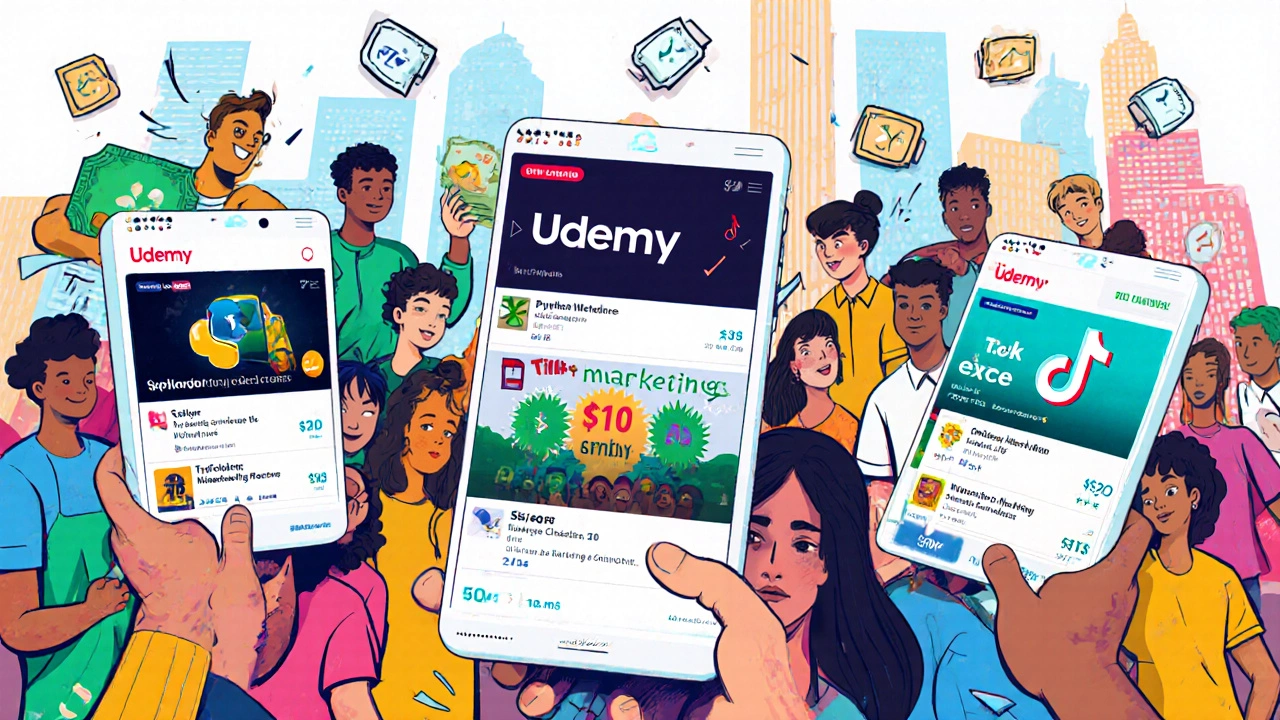
When you're trying to learn something new-whether it's coding, business, or even how to bake sourdough-you don't need to enroll in a physical class anymore. The right online learning platform can give you the same depth, flexibility, and sometimes even better resources than a traditional course. But with hundreds of options out there, which ones actually deliver? Not all platforms are built the same. Some are for professionals looking to upskill, others for kids learning math, and a few are free for everyone. Let’s cut through the noise and look at the four platforms that stand out in 2025: Coursera, Udemy, edX, and Khan Academy.
Coursera: For Career-Driven Learners
Coursera isn’t just another site with video lectures. It’s a bridge between universities and working professionals. Founded in 2012 by Stanford professors, it now partners with over 300 universities and companies, including Stanford, Yale, Google, and IBM. What makes it different? You can earn accredited certificates, specializations, and even full online degrees-some of which are accepted by employers as equivalent to on-campus credentials.
Take the Google Data Analytics Professional Certificate. It’s a six-month program that teaches SQL, Tableau, and R. Over 1.5 million people have completed it, and many landed entry-level jobs in data analysis afterward. The platform also offers Guided Projects-short, hands-on tasks that take under two hours. These are perfect if you’re short on time but want to build something real.
Cost-wise, most individual courses run $49-$99. Specializations are $39-$79 per month. Degrees can cost thousands, but financial aid is available and often approved within days. If you’re serious about advancing your career, Coursera gives you credentials that show up on LinkedIn and resume scanners.
Udemy: The Marketplace for Practical Skills
If Coursera feels like a university, Udemy feels like a digital bazaar. Anyone can create a course here-teachers, freelancers, industry experts, even hobbyists. That means you’ll find courses on everything: Excel macros for accountants, TikTok marketing for small businesses, or how to fix a leaky faucet.
Unlike Coursera, Udemy doesn’t focus on accreditation. Instead, it focuses on speed and affordability. Most courses cost between $10 and $20 during sales (which happen almost weekly). You pay once, and you own it forever. No subscriptions. No deadlines. You can watch on your phone while commuting, pause to try something out, and come back later.
Top-rated courses often have 100,000+ students. The Python for Beginners course by Jose Portilla, for example, has over 2.3 million enrollments. Why? Because it’s clear, practical, and doesn’t waste time on theory. Udemy’s rating system works too-you can see real student reviews, sample videos, and even ask questions to the instructor. It’s the go-to for people who want to learn a skill fast and cheap.

edX: The Nonprofit Alternative with Academic Rigor
edX started in 2012 as a nonprofit by Harvard and MIT. Its mission? Make elite education accessible. Today, it still carries that DNA. You’ll find courses from MIT, Berkeley, Harvard, and even the United Nations. The content is often more theoretical and research-backed than what you’ll find elsewhere.
edX offers MicroMasters programs-graduate-level sequences that can count toward a full master’s degree if you later enroll in the partner university. For example, the MIT MicroMasters in Supply Chain Management is accepted by several universities as credit toward an MBA. These aren’t easy. They require serious time: 10-15 hours a week for 6-12 months.
Most courses are free to audit. You only pay if you want a verified certificate (usually $50-$300). If you’re a student, a researcher, or someone who values academic depth over job titles, edX is unmatched. It’s also the only platform where you can take a full computer science degree from MIT for under $20,000-far less than on-campus tuition.
Khan Academy: Free, Simple, and Perfect for Beginners
Khan Academy is the quiet giant. No ads. No sales pitches. No certificates that matter to employers. Just free, high-quality lessons from kindergarten to college level. It was started in 2006 by Salman Khan, who began tutoring his cousin over YouTube. Today, it’s used by over 120 million learners worldwide.
Its strength? Simplicity. Math, science, economics, computing, test prep-all broken into 5-15 minute videos with interactive exercises. If you’re struggling with algebra or don’t understand how vaccines work, Khan Academy will explain it without jargon. Teachers use it in classrooms. Parents use it to help with homework. Students preparing for SATs or AP exams rely on it.
It’s not for career advancement. You won’t get a credential employers recognize. But if you need to fill a knowledge gap, rebuild a foundation, or help a child learn, nothing beats it. And it’s completely free-no credit card needed, no trials, no hidden fees.

Which One Should You Choose?
It depends on what you want.
- If you want a recognized credential to boost your resume → Coursera
- If you want to learn a skill fast and cheap → Udemy
- If you want university-level depth without paying full tuition → edX
- If you need free, clear explanations for school or personal growth → Khan Academy
Many learners use more than one. A software developer might take Python on Udemy, then enroll in a Coursera specialization on machine learning, and use Khan Academy to brush up on calculus. There’s no rule that says you have to pick just one.

What These Platforms Don’t Tell You
Not all courses are created equal-even on the same platform. On Udemy, a course with 100,000 enrollments might have a 4.5-star rating, but 70% of those reviews are from people who watched just the first video. Look at the detailed reviews. Check the date. Is the course updated in the last year? A Python course from 2020 might still teach Python 2.7.
Coursera’s financial aid form asks for your income and why you need help. Most people get approved if they answer honestly. Don’t assume you’re not eligible.
edX’s MicroMasters programs are intense. You need to treat them like a real course. Set a schedule. Block time. If you don’t, you’ll fall behind.
Khan Academy has no deadlines, but that’s also its trap. Without structure, many people start and never finish. Set your own goal: "I’ll do one math lesson every weekday."
Final Thoughts
The four platforms-Coursera, Udemy, edX, and Khan Academy-cover the full spectrum of online learning. You don’t need to pick the "best." You need to pick the right one for your goal. Want a job? Go for Coursera. Want to fix your website? Try Udemy. Want to understand physics? edX. Want to help your kid with fractions? Khan Academy.
Learning isn’t about the platform. It’s about what you do with it. Start small. Finish one course. Then another. That’s how real skills are built-not by switching platforms, but by sticking with one long enough to change how you think.
Are these platforms free?
Khan Academy is completely free. Coursera and edX let you audit most courses for free, but you pay if you want a certificate or graded assignments. Udemy courses are paid upfront, but they often go on sale for under $15.
Can I get a degree from these platforms?
Yes, but only through Coursera and edX. Coursera offers full online bachelor’s and master’s degrees from accredited universities. edX offers MicroMasters, which can count as credit toward a master’s degree if you enroll in the partner university. Udemy and Khan Academy don’t offer degrees.
Which platform is best for coding?
Udemy has the widest selection of coding courses at low prices. Coursera offers structured programs from top schools like Stanford and MIT. edX has rigorous computer science tracks. Khan Academy is great for absolute beginners learning basics like HTML or JavaScript. Most coders use a mix.
Do employers recognize certificates from these platforms?
Yes, especially from Coursera and edX. Google, IBM, and other companies issue certificates on Coursera that are listed on job postings. edX MicroMasters are accepted by universities as graduate credit. Udemy certificates are less formal but still useful to show initiative. Khan Academy certificates aren’t recognized by employers.
Can I learn a language on these platforms?
Khan Academy offers basic Spanish and other languages for kids. Coursera has full language courses from universities like the University of London. edX has academic language programs. Udemy has dozens of courses for learning Spanish, French, Mandarin, etc., often with conversation practice. For serious language learning, combine these with apps like Duolingo.
